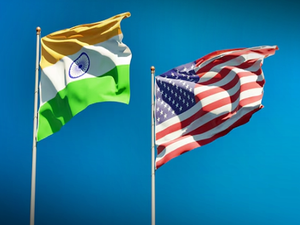New Delhi: India and the US are negotiating a multi-sector bilateral trade agreement and as a part of the negotiations, both sides are discussing liberalisation of trade in goods, including non-sensitive agricultural products, Parliament was informed Tuesday.
The government is engaged with all relevant stakeholders including agriculture, farming experts, to assess the interests and requirements of India’s rural economy, farmers and agricultural sector, Minister of State for Commerce and Industry Jitin Prasada said in a written reply to the Lok Sabha.
“India and the USA are negotiating a multi-sector Bilateral Trade Agreement (BTA). As a part of negotiations, among other things, both sides are engaged in discussions on liberalization of trade in goods, including non-sensitive agricultural products, with the aim to expand trade and deepen the India-US trade relationship,” he said.
He added that the government is committed to taking all necessary steps to secure and advance the country’s national interest and protect the welfare of our farmers, rural economy and agriculture sector.
So far, five rounds of talks have been completed between the two countries on the proposed BTA. The US team has recently postponed their visit for the sixth round of negotiations, which was scheduled from August 25.
In a separate reply, he said a reciprocal tariff at the rate of 25 per cent has been imposed on certain goods exported from India to the US starting from August 7. Further, additional duty of 25 per cent with effect from August 27, 2025 has been imposed on certain goods exported from India.
“The Government has taken note of tariff imposition by the US,” the minister said, adding it is estimated that around USD 48.2 billion of India’s merchandise export (based on 2024 trade value) to the US will be subject to the above additional tariffs.
He said that the government is committed to secure and advance the country’s national interest and protect the welfare of Indian farmers, workers, entrepreneurs, exporters, MSMEs and all sections of industry and take all necessary steps to help mitigate impact on trade including through appropriate export promotion and trade diversification measures.
Replying to a separate question, Prasada said India has entered into a Double Taxation Avoidance Agreement with the US that applies to the corporate taxation of Indian companies in the United States.
The benefits available in this agreement remain unchanged irrespective of the domestic laws of the US. The US has not implemented the global minimum tax rules so far, and has stated that the commitment made by prior administration on it shall have no effect in America unless they are adopted in its domestic laws.
“This is unlikely to affect taxation of Indian companies in the United States. US Corporate tax changes generally apply to entities with US tax liability and are not expected to directly affect exporters that sell from India,” the minister said adding the government is engaged with all relevant stakeholders including industry to protect country’s economic and commercial interests and to mitigate impact on trade through all appropriate steps including export promotion and trade diversification.
In an another reply, the minister said the US has announced countervailing duties (CVD) on export of Melamine, Hexamine, Epoxy Resins, Ceramic Tile, Hard Empty Capsules, Overhead Door Counterbalance Torsion Springs, and High Chrome Cast Iron Grinding Media from India in the period January to July 2025.
On April 2, he said, the US announced country specific reciprocal tariffs including on India.
“A baseline tariff of 10 per cent on nearly all US imports was imposed w.e.f. April 5, 2025, with country-specific reciprocal tariffs, including on India @26 per cent, which was to be effective from April 9, 2025. However, on India, these reciprocal tariffs were suspended till August 1, 2025. India’s export to the US covered by country-specific reciprocal tariffs, as per data for 2024, was USD 48.2 billion,” Prasada said.
The government, he added, is committed to taking all necessary steps to secure and advance the country’s national interest and protect the welfare of our farmers, workers, entrepreneurs, exporters, MSMEs and employment-intensive industries to mitigate the impact on trade, including through appropriate export promotion and trade diversification measures.
“Government is engaged with all stakeholders, including exporters and industry, for taking feedback on their assessment of the situation,” he said.
PTI
